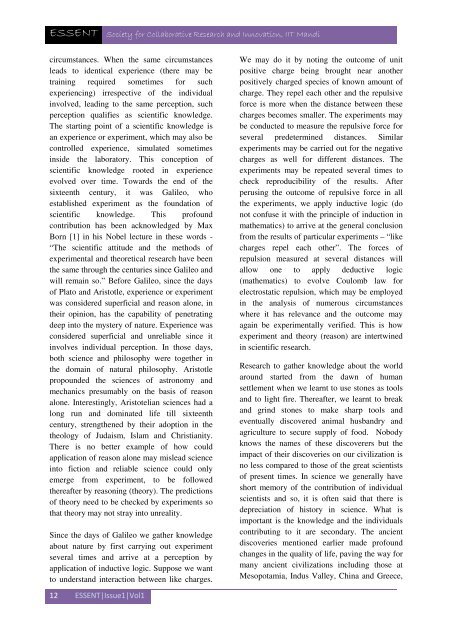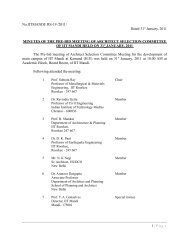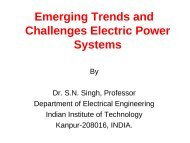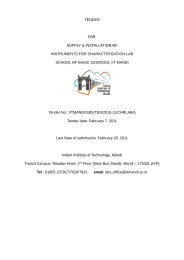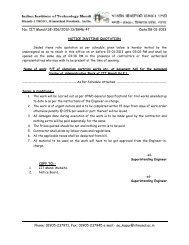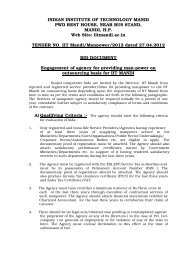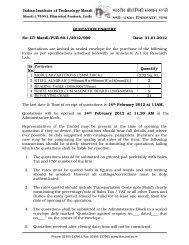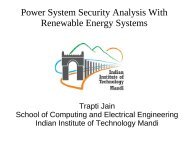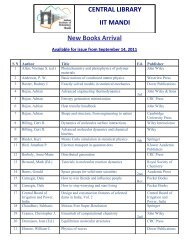Issue1. Vol.1 (April, 2013) - IIT Mandi
Issue1. Vol.1 (April, 2013) - IIT Mandi
Issue1. Vol.1 (April, 2013) - IIT Mandi
- No tags were found...
You also want an ePaper? Increase the reach of your titles
YUMPU automatically turns print PDFs into web optimized ePapers that Google loves.
ESSENT Society for Collaborative Research and Innovation, <strong>IIT</strong> <strong>Mandi</strong>circumstances. When the same circumstancesleads to identical experience (there may betraining required sometimes for suchexperiencing) irrespective of the individualinvolved, leading to the same perception, suchperception qualifies as scientific knowledge.The starting point of a scientific knowledge isan experience or experiment, which may also becontrolled experience, simulated sometimesinside the laboratory. This conception ofscientific knowledge rooted in experienceevolved over time. Towards the end of thesixteenth century, it was Galileo, whoestablished experiment as the foundation ofscientific knowledge. This profoundcontribution has been acknowledged by MaxBorn [1] in his Nobel lecture in these words -“The scientific attitude and the methods ofexperimental and theoretical research have beenthe same through the centuries since Galileo andwill remain so.” Before Galileo, since the daysof Plato and Aristotle, experience or experimentwas considered superficial and reason alone, intheir opinion, has the capability of penetratingdeep into the mystery of nature. Experience wasconsidered superficial and unreliable since itinvolves individual perception. In those days,both science and philosophy were together inthe domain of natural philosophy. Aristotlepropounded the sciences of astronomy andmechanics presumably on the basis of reasonalone. Interestingly, Aristotelian sciences had along run and dominated life till sixteenthcentury, strengthened by their adoption in thetheology of Judaism, Islam and Christianity.There is no better example of how couldapplication of reason alone may mislead scienceinto fiction and reliable science could onlyemerge from experiment, to be followedthereafter by reasoning (theory). The predictionsof theory need to be checked by experiments sothat theory may not stray into unreality.Since the days of Galileo we gather knowledgeabout nature by first carrying out experimentseveral times and arrive at a perception byapplication of inductive logic. Suppose we wantto understand interaction between like charges.We may do it by noting the outcome of unitpositive charge being brought near anotherpositively charged species of known amount ofcharge. They repel each other and the repulsiveforce is more when the distance between thesecharges becomes smaller. The experiments maybe conducted to measure the repulsive force forseveral predetermined distances. Similarexperiments may be carried out for the negativecharges as well for different distances. Theexperiments may be repeated several times tocheck reproducibility of the results. Afterperusing the outcome of repulsive force in allthe experiments, we apply inductive logic (donot confuse it with the principle of induction inmathematics) to arrive at the general conclusionfrom the results of particular experiments – “likecharges repel each other”. The forces ofrepulsion measured at several distances willallow one to apply deductive logic(mathematics) to evolve Coulomb law forelectrostatic repulsion, which may be employedin the analysis of numerous circumstanceswhere it has relevance and the outcome mayagain be experimentally verified. This is howexperiment and theory (reason) are intertwinedin scientific research.Research to gather knowledge about the worldaround started from the dawn of humansettlement when we learnt to use stones as toolsand to light fire. Thereafter, we learnt to breakand grind stones to make sharp tools andeventually discovered animal husbandry andagriculture to secure supply of food. Nobodyknows the names of these discoverers but theimpact of their discoveries on our civilization isno less compared to those of the great scientistsof present times. In science we generally haveshort memory of the contribution of individualscientists and so, it is often said that there isdepreciation of history in science. What isimportant is the knowledge and the individualscontributing to it are secondary. The ancientdiscoveries mentioned earlier made profoundchanges in the quality of life, paving the way formany ancient civilizations including those atMesopotamia, Indus Valley, China and Greece,12 ESSENT|Issue1|Vol1


